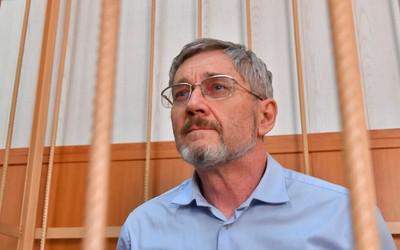On Tuesday, September 19, the Tagansky District Court of Moscow sentenced the financier and ex-deputy chairman of the Bank of Russia to seven years in a general regime colony Konstantina Korishchenko, RBC correspondent reports. Korishchenko was found guilty of embezzlement (Part 4 of Article 160 of the Criminal Code of the Russian Federation) of 1.4 billion rubles, which provoked the bankruptcy of Investment Bank in 2013, in which he held the position of Chairman of the Board.
The second person involved in the trial, businessman and alleged partner of Korishchenko Maxim Palchun, received seven years in prison. None of the defendants admitted guilt.
The court also fined both of them 1 million rubles. and was deprived of the right to hold management positions in commercial organizations for three years.
The court also upheld the claim of the Deposit Insurance Agency against the defendants for damages in the amount of 549.2 million rubles.
Kommersant.Ru, 09.19.2023, “Ex-deputy chairman of the Central Bank Korishchenko was sentenced to 7 years for theft of Investbank assets”: Both convicts did not admit guilt. The court also upheld the claim of the Deposit Insurance Agency for damages and decided to recover 549 million 250 thousand 300 rubles from the men.—Insert K.ru
Korishchenko was detained and sent to pre-trial detention in June 2021. At that time, he headed the department of “Stock markets and financial engineering” at the Russian Academy of National Economy and Public Administration under the President of Russia (RANEPA). In June 2022 the court released him under house arrest, but after a little more than a year returned to the isolation ward.
How a former Central Bank manager became involved in the case of the collapsed Investment Bank
Korishchenko worked as deputy chairman of the Central Bank from 2002 to 2008, then for two years he was president of the Moscow Interbank Currency Exchange (MICEX), which then still belonged to the regulator. In 2010, Korishchenko moved into the banking business, heading the Russian office of the American investment bank Merrill Lynch, and in 2012 he became the chairman of the board of Investbank. Credit institution at that time occupied 84th in the country in terms of assets.
Investment Bank lost its license on the same day as two other players. At the end of 2013, the Central Bank just started to the start of large-scale clearing of the sector.
Initially, Investbank began having difficulties in fulfilling its obligations to clients, and on December 13 it lost its license from the Central Bank. In the regulator’s comment notedthat the bank provided unreliable reporting, and the necessary additional creation of reserves would lead to a complete loss of capital. The Deposit Insurance Agency (DIA) preliminary estimated the volume of payments to individual depositors of Investbank at 29.4 billion rubles. – at that time it was the second largest case after the collapse of Master Bank. The “hole” in the capital of the credit institution subsequently reached 60 billion rubles.
Kommersant wrote that in the criminal case against the ex-deputy chairman of the Central Bank, we are talking about the embezzlement of securities belonging to Investbank – shares of two commercial investment funds worth 1.4 billion rubles. Before the license was revoked from the bank, Korishchenko, as the head of the board, signed an agreement on the alienation of land shares in Istra, near Moscow, in exchange for an unsecured promissory note from Zodiac-Trade LLC. The shareholder on behalf of the foreign company was Maxim Palchun. According to investigators, Korishchenko was the organizer of this scheme. Kommersant, citing the case materials, noted that the withdrawal of assets took place in December 2013. In September 2013 Vedomosti reportedthat Korishchenko left the post of Chairman of the Board of Investbank.
Korishchenko is not the only person involved in cases surrounding the bankruptcy of Investbank. Almost immediately after the license was revoked, the Internal Affairs Directorate of the Central District of Moscow began to investigate a case of large-scale theft from a credit institution. In May 2015, employees of the Investigative Committee and the FSB detained one of the shareholders of Investbank Sergei Mastyugin. He, together with the acting chairman of the bank Olga Borgardt received a sentence in a case of deliberate bankruptcy. Four more people from among the owners and top managers of Investbank passed in a case of embezzlement. The DIA, as the bankruptcy trustee of a credit organization, also brought Korishchenko and about ten other “persons who controlled the bank” to subsidiary liability. In February 2022, Korishchenko was declared bankrupt, and his financial manager tried to release the financier from subsidiary liability in the Investbank case, but the court upheld the original decision.
Pravo.Ru, 09/13/2023, “The ex-deputy chairman of the Central Bank was declared bankrupt”: On February 17, the Moscow Arbitration Court declared Konstantin Korishchenko bankrupt (case No. A40-26846/2021). The recognition of the former deputy chairman of the Bank of Russia as insolvent was initiated by a certain Alexey Kharchenko, who issued him a loan of 1.5 million rubles in 2019. By the time the case was considered in court, 3.1 million rubles had been added to the principal amount of the debt. penalties and more than 235,000 rubles. interest for using the loan.
But Kharchenko is not the only potential creditor of Korishchenko. ASGM also considers the demands of the Deposit Insurance Agency, which it sent on behalf of Investbank. Korishchenko headed it until the license was revoked in 2013. A bankrupt credit institution requests that the ex-manager be held vicariously liable for its debts (case No. A40-226/2014). The ASGM suspended the proceedings on this application until the issue of the “subsidiary” is resolved. […]
Last June, ASGM introduced a restructuring of Korishchenko’s debts and appointed Adam Leviev as his financial manager. Korishchenko served as Deputy Chairman of the Central Bank from 2002 to 2008. Subsequently, he became the head of the department at the Russian Academy of National Economy and Public Administration (RANEPA). — Insert K.ru








